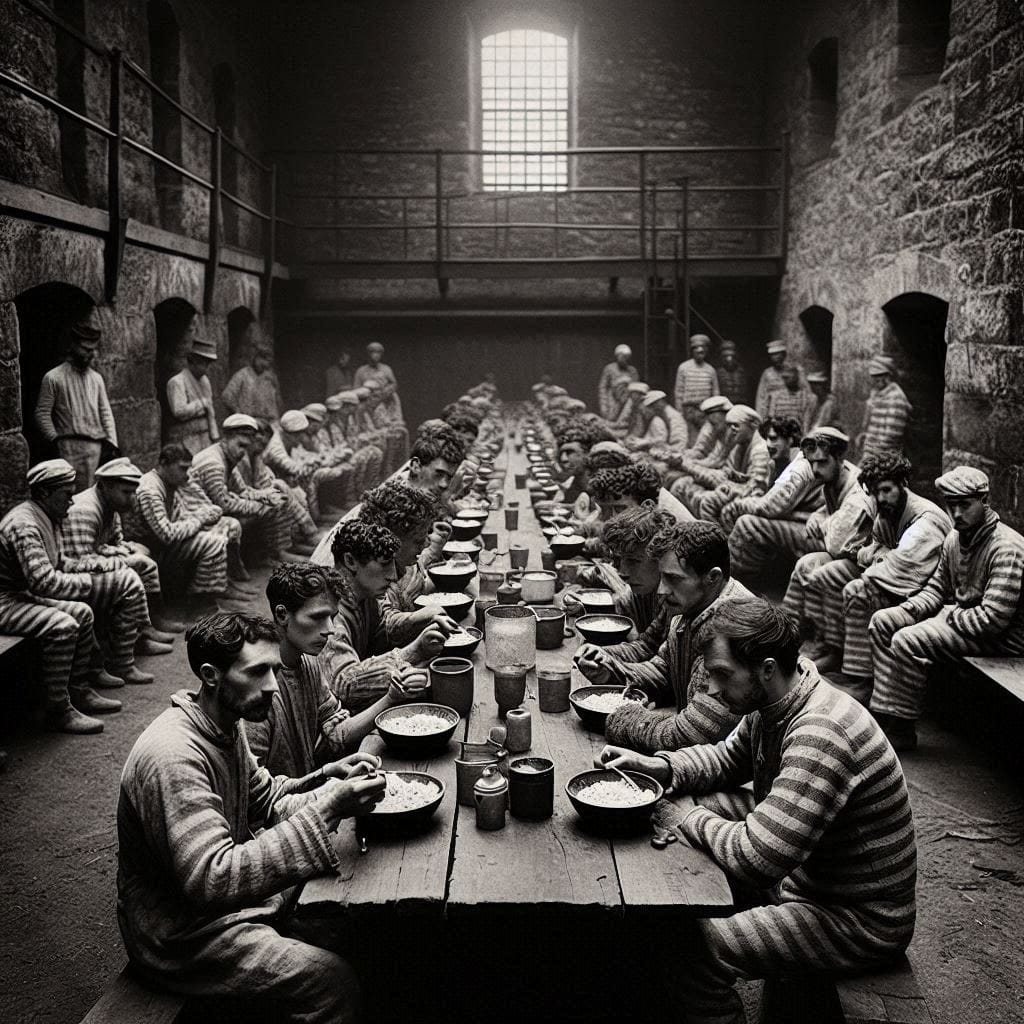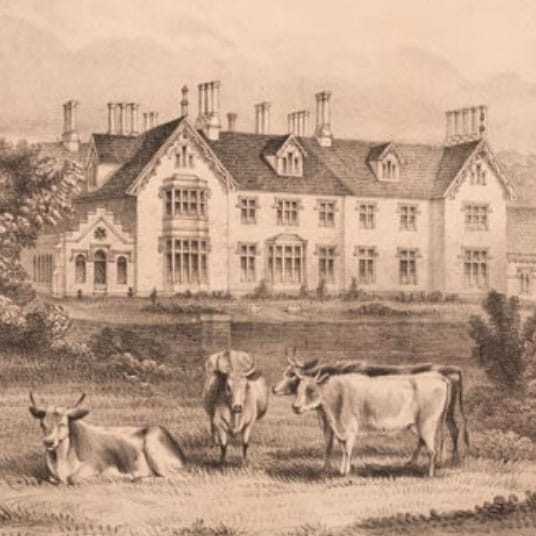The weekly newsletters on The Newport Cornucopia regularly mention the crimes being committed in Newport and if not fined, the guilty person is sent to gaol, often the Usk House of Correction which opened in 1844 and subsequently became the Monmouthshire County Gaol in 1870 which superseded the other gaol — the Monmouth County Gaol. The Monmouthshire County Gaol is still there today as HMP Usk.
This article published in the Monmouthshire Merlin in March 1855 gives an insight into what the prisons were eating and the effort to make the food below that which could found at the workhouse to prevent people choosing prison as a better alternative.
There's also discussion on the use of Indian meals such as if it's suitable for the prisoners.

The Prison Dietary
Report of the Visiting Justices of the two prisons, of the reasons and experience upon which they recommend the dietary adopted at the October Sessions, 1854, and of their subsequent experience:-
"The object of this report, is to answer the objections of Mr. Perry, the inspector of prisons, contained in his two reports of the 21st August, 1854, and 12th December, 1854.
"Mr. Perry's second report refers to his first report, and says the objections here set forth, have received no answer from the magistrates that the circumstances to which the first report applied, were very different from those to which the second report is applicable—the dietary to which the first referred, being for long-timed prisoners, and prisoners before trial, substantially different from that which to which the first report objected. This alteration furnishes the answer to many of the objections and Mr. Perry, in an interview with one of the visiting justices of the House of Correction, only made objection to the dietary, as respects long-timed prisoners.
"The present dietary is, for prisoners under more than three months' imprisonment, assimilated to the former dietary only for three days in the week for the other four days, a more generous—namely, a meat or soup—diet, is substituted and on those days, the diet is superior to the official dietary, by milk being given at breakfast and supper.
"This answers the objections as to want of variety disposing to eruptions and scurvy, to constipation and diarrhoea, and of general disagreement with health. The only applicable objections in the second report, are those which relate to the use of Indian meal, under any circumstances. Mr. Perry says that Indian meal generally disagrees, and is unpalatable.
"The object of the visiting justices has been, to use a dietary which, being sufficiently nutritious, is at the same time not so superior to the diet of ordinary workmen, as to induce indigent and idle people to consider the prison a comfortable and desirable asylum, preferable to a workhouse.
"The use of Indian meal, even in the larger proportion in which it entered into the former dietary—still recommended for short-timed prisoners—is highly approved by the last report of Colonel Jebb on the nine military prisons of the United Kingdom (1853, printed in 1854), in all of which it is adopted and by all the surgeons and governors of those prisons. No observation is there made, that it disposes to eruptions or scurvy, or that it is unpalatable. It is well known to be the principal food in some countries, and to be preferred by many persons having other food. It was known to one of the agistrates of this county, to have been reorted to on board a ship, with manifest increase of health and plumpness, and with the effect of dispelling scurvy.
"While the milk and porridge dietary was in use in the prisons of this county, the health of many of the prisoners improved considerably; there was a smaller proportion of sick on the surgeons' journals; and the general health of the prisoners was better than before, till the occurrence of extraordinary atmospheric influences, during the last spring and summer.
"Mr. Perry's report notices the habitual rejection of the Indian-meal porridge by many of the prisoners.
"The accurate entries in our House of Correction, show that the quantity of Indian meal left uneaten, from all causes, has amounted to little or nothing, and has not exceeded that of the oatmeal porridge. This rejection is ascertained to have taken place from other causes than that of dislike.
"The following are the proportions of each article returned uneaten from January 1st, to June 11th, 1854, both days inclusive. There were given out for consumption

The porridge returned, as entered in the turnkey's journal during the same period, was —

"The remarks of the surgeon of the County Gaol, and Mr. Perry's remarks in his first report, had especial reference to a temporary outbreak of fever in the gaol, which lasted for a very short time; and, so far from this fever (which prevailed at the same time in the town) having been caused or aggravated by the dietary, one of the severest cases in the gaol was that of one of the turnkeys, who did not use the prison dietary. Up to that time, the surgeon had uniformly reported in favour of the dietary.
'The alteration in the dietary was first made, not from any belief that it was insufficient for the general purposes of health, but to meet the requirements of the particular season, when an exceptional state of the atmosphere prevailed, affecting the health of the prisoners, and the visiting justices considered it a temporary measure to suit the occasion; and they afterwards recommended that it should be made permanent, in deference to the recommendation of the Secretary of State, that the sessions should adopt Mr. Perry s suggestion of a return to the official dietary.
"In conclusion, we submit that Mr. Perry's remarks are scarcely at all applicable to the present dietary, and that in so far as they are applicable, they have been answered. Our subsequent experience entirely confirms the opinion now expressed, and our former opinion.
"The Surgeon of the House of Correction reports that there is not a single instance amongst the short-timed prisoners, in which any injury has arisen from the use of the milk and prison dietary, or to the long-timed prisoners, from the use of the recently-adopted dietary that, on the contrary, a great many of the prisoners have improved considerably in health and condition and that the present Health of the prison is quite equal to what it ever was, previous to the exceptional state during the last spring and summer."
— Monmouthshire Merlin, Saturday 23rd March, 1855









Member discussion